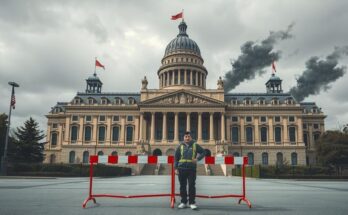In Equatorial Guinea, political interference within the Bar Association has led to the suspension of human rights lawyers Gemma Jones and Angel Obama, hindering access to justice and violating their rights. As both lawyers fight against these oppressive measures, the urgent need for an independent legal system becomes increasingly evident.
In Equatorial Guinea, the legal system is marred by political interference, particularly within the Bar Association, which endangers human rights and the rule of law. Recent actions against two human rights lawyers, Gemma Jones and Angel Obama, reveal a grim reality for legal professionals who dare to speak out against injustices. Both lawyers have faced suspensions aimed at silencing their advocacy for the independence of the judiciary and the defense of human rights. Gemma Jones, a human rights lawyer of Equatoguinean descent, became a target after her vocal denunciation of dire social injustices in Equatorial Guinea, evidenced by her November 2023 TikTok video “Wake Up” (Despierten). Shortly after, the Bar Association launched a disciplinary action against her leading to a two-year suspension. Margaret Satterthwaite, an esteemed UN special rapporteur, expressed her concern regarding the severe sanctions against Jones. Despite the threats and harassment she faces, including her arbitrary arrest in 2021, Jones remains unyielding in her fight for justice. Her dedication stands in stark contrast to the oppressive tactics used to stifle dissent and human rights advocacy. In a similar vein, Angel Obama, navigating the treacherous waters of human rights law since 2018, has persevered despite threats of suspension for defending marginalized groups, showcasing his resilient spirit in the face of an oppressive regime. The Bar Association, dominated by political interests, reflects a broader issue: lawyers who voice the need for justice and independence are systematically sidelined. The intersection of their personal battles and the political landscape in Equatorial Guinea illustrates a profound crisis in the legal fraternity, fostering an environment where defending the defenseless is fraught with peril. Equatorial Guinea is a signatory to various international human rights treaties, including the International Covenant on Civil and Political Rights, which obligates them to uphold the independence of the judiciary. However, this commitment stands in stark contrast to current practices, where lawyers are not just threatened but actively punished for exercising their fundamental rights. The international community, including Amnesty International, underscores the urgent need for the Equatorial Guinean government to reverse these suspensions and allow lawyers to freely champion human rights. Such actions would not just reflect respect for individual rights but reinforce the very foundation of a just society. Failure to correct these injustices not only undermines the rule of law but also puts countless victims of human rights violations at further risk.
The interplay of law and politics in Equatorial Guinea has led to a troubling environment for human rights advocates. The national Bar Association, which should serve as a guardian of legal integrity, is instead being manipulated to suppress dissent. Both Gemma Jones and Angel Obama have found themselves suspended for their unwavering commitment to defending human rights despite facing significant personal and professional risks. This precarious situation reflects a broader trend of growing repression against legal professionals who advocate for justice.
The suspensions of Gemma Jones and Angel Obama illuminate a critical issue within Equatorial Guinea’s legal landscape, where political interference stifles human rights advocacy. The urgent call for the reversal of these suspensions, alongside an appeal to respect the independence of the Bar Association, highlights a fundamental need for reform in the country’s justice system. Only through recognizing and protecting the rights of lawyers can a path to true justice and accountability be forged.
Original Source: www.amnesty.org


